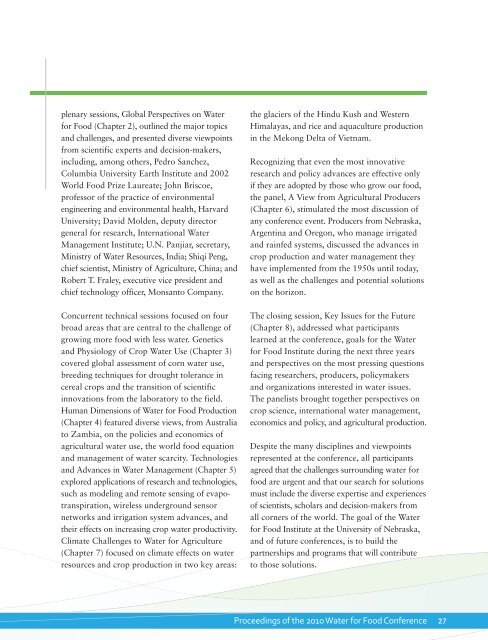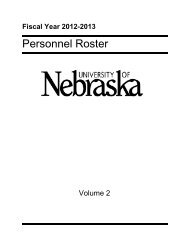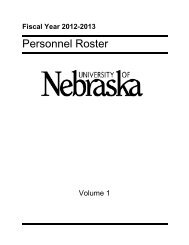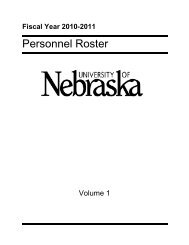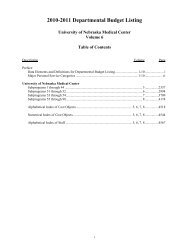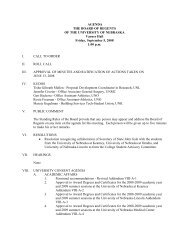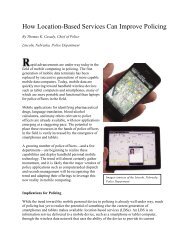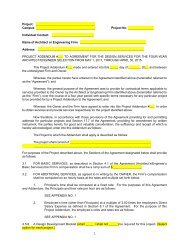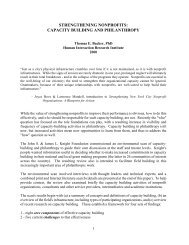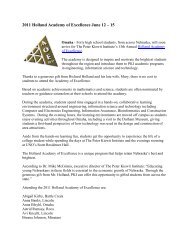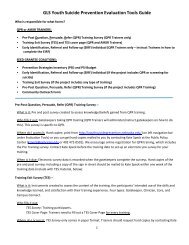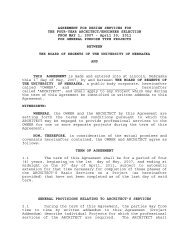Full Version - Water for Food Institute - University of Nebraska
Full Version - Water for Food Institute - University of Nebraska
Full Version - Water for Food Institute - University of Nebraska
You also want an ePaper? Increase the reach of your titles
YUMPU automatically turns print PDFs into web optimized ePapers that Google loves.
plenary sessions, Global Perspectives on <strong>Water</strong><br />
<strong>for</strong> <strong>Food</strong> (Chapter 2), outlined the major topics<br />
and challenges, and presented diverse viewpoints<br />
from scientific experts and decision-makers,<br />
including, among others, Pedro Sanchez,<br />
Columbia <strong>University</strong> Earth <strong>Institute</strong> and 2002<br />
World <strong>Food</strong> Prize Laureate; John Briscoe,<br />
pr<strong>of</strong>essor <strong>of</strong> the practice <strong>of</strong> environmental<br />
engineering and environmental health, Harvard<br />
<strong>University</strong>; David Molden, deputy director<br />
general <strong>for</strong> research, International <strong>Water</strong><br />
Management <strong>Institute</strong>; U.N. Panjiar, secretary,<br />
Ministry <strong>of</strong> <strong>Water</strong> Resources, India; Shiqi Peng,<br />
chief scientist, Ministry <strong>of</strong> Agriculture, China; and<br />
Robert T. Fraley, executive vice president and<br />
chief technology <strong>of</strong>ficer, Monsanto Company.<br />
Concurrent technical sessions focused on four<br />
broad areas that are central to the challenge <strong>of</strong><br />
growing more food with less water. Genetics<br />
and Physiology <strong>of</strong> Crop <strong>Water</strong> Use (Chapter 3)<br />
covered global assessment <strong>of</strong> corn water use,<br />
breeding techniques <strong>for</strong> drought tolerance in<br />
cereal crops and the transition <strong>of</strong> scientific<br />
innovations from the laboratory to the field.<br />
Human Dimensions <strong>of</strong> <strong>Water</strong> <strong>for</strong> <strong>Food</strong> Production<br />
(Chapter 4) featured diverse views, from Australia<br />
to Zambia, on the policies and economics <strong>of</strong><br />
agricultural water use, the world food equation<br />
and management <strong>of</strong> water scarcity. Technologies<br />
and Advances in <strong>Water</strong> Management (Chapter 5)<br />
explored applications <strong>of</strong> research and technologies,<br />
such as modeling and remote sensing <strong>of</strong> evapotranspiration,<br />
wireless underground sensor<br />
networks and irrigation system advances, and<br />
their effects on increasing crop water productivity.<br />
Climate Challenges to <strong>Water</strong> <strong>for</strong> Agriculture<br />
(Chapter 7) focused on climate effects on water<br />
resources and crop production in two key areas:<br />
the glaciers <strong>of</strong> the Hindu Kush and Western<br />
Himalayas, and rice and aquaculture production<br />
in the Mekong Delta <strong>of</strong> Vietnam.<br />
Recognizing that even the most innovative<br />
research and policy advances are effective only<br />
if they are adopted by those who grow our food,<br />
the panel, A View from Agricultural Producers<br />
(Chapter 6), stimulated the most discussion <strong>of</strong><br />
any conference event. Producers from <strong>Nebraska</strong>,<br />
Argentina and Oregon, who manage irrigated<br />
and rainfed systems, discussed the advances in<br />
crop production and water management they<br />
have implemented from the 1950s until today,<br />
as well as the challenges and potential solutions<br />
on the horizon.<br />
The closing session, Key Issues <strong>for</strong> the Future<br />
(Chapter 8), addressed what participants<br />
learned at the conference, goals <strong>for</strong> the <strong>Water</strong><br />
<strong>for</strong> <strong>Food</strong> <strong>Institute</strong> during the next three years<br />
and perspectives on the most pressing questions<br />
facing researchers, producers, policymakers<br />
and organizations interested in water issues.<br />
The panelists brought together perspectives on<br />
crop science, international water management,<br />
economics and policy, and agricultural production.<br />
Despite the many disciplines and viewpoints<br />
represented at the conference, all participants<br />
agreed that the challenges surrounding water <strong>for</strong><br />
food are urgent and that our search <strong>for</strong> solutions<br />
must include the diverse expertise and experiences<br />
<strong>of</strong> scientists, scholars and decision-makers from<br />
all corners <strong>of</strong> the world. The goal <strong>of</strong> the <strong>Water</strong><br />
<strong>for</strong> <strong>Food</strong> <strong>Institute</strong> at the <strong>University</strong> <strong>of</strong> <strong>Nebraska</strong>,<br />
and <strong>of</strong> future conferences, is to build the<br />
partnerships and programs that will contribute<br />
to those solutions.<br />
Proceedings <strong>of</strong> the 2010 <strong>Water</strong> <strong>for</strong> <strong>Food</strong> Conference 27


